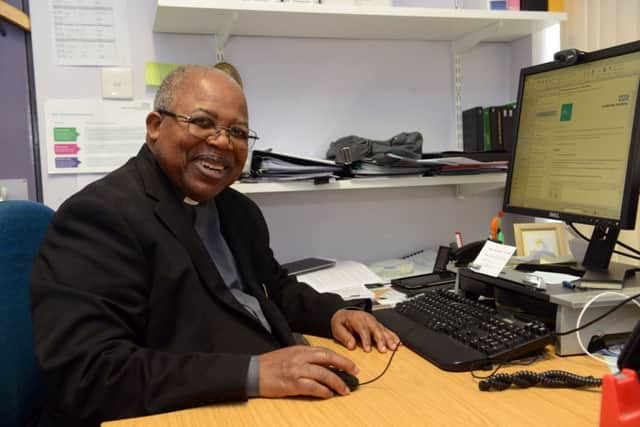Leeds NHS chaplain talks of importance of compassionate service


That’s the view of the Rev Michael Mkpadi, the chaplain at Leeds and York Partnership NHS Foundation Trust, who oversees a service focusing on looking after the wellbeing of staff who deal with some of the city’s most vulnerable patients.
The YEP spoke with him about the compassionate care service that he implemented at the trust, for the first day of a series of stories to mark Mental Health Awareness Week.
Advertisement
Hide AdAdvertisement
Hide Ad“One day I was doing some work and I had a staff nurse who came down with a patient,” says Rev Mkpadi, who has been at the trust since 2008.
“He was waiting for the patient who was in another room and talking to my secretary at the time. He was in tears.
“He said ‘I just don’t know what else to do [to help him]’.”
The member of staff is one of dozens at the trust working on the frontline of mental health wards in Leeds, which takes patients who are among the most vulnerable in the city.
Advertisement
Hide AdAdvertisement
Hide AdRev Mkpadi said that after reading a Government-issued document, advising organisations on how to implement more compassionate care in the workplace, he decided to create a similar service for the trust.
“I read the Government document and said to myself: ‘While people are working they are burning themselves out without having support’.
“I drew up a presentation and approached managers with a plan.
I told them ‘we have to transform this into an ongoing exercise’.
Advertisement
Hide AdAdvertisement
Hide Ad“I took it to a number of directors and they said I could try it out as a pilot in 2013 on two of our mental health wards.”
The 2013 pilot at The Mount was a success, he says.
It involved getting staff on the wards to sign up to a series of ‘ground rules’ - like agreeing to offer help, or even a drink, to colleagues who were under pressure.
“Unless the team is compassionate, the individual members of staff can not sustain compassionate care for patients without burning out,” Rev Mkpadi says.
“I think the initial ideas about compassionate care were focused entirely on patients.
Advertisement
Hide AdAdvertisement
Hide Ad“But we quickly realised that for that to be sustainable, you have to care for the staff as well and get them to look after each other and support each other.
“Sometimes a member of staff is at the point of tears and someone can create a relief by just taking over or supporting them.”
His words come as the YEP is also calling on people across the city to help make Leeds mentally healthy, as part of our #SpeakYourMind campaign.
He said one of the “stipulations” he gave managers, when approaching them about the compassionate care service, was that the trust would provide all attendees at the monthly compassionate meetings with lunch.
Advertisement
Hide AdAdvertisement
Hide Ad“If you call a meeting and provide sandwiches, they will come,” he laughs.
The group meetings are now held on a monthly basis at the trust’s Newsham Centre, Becklin Centre and The Mount sites.
“They are for people to come together and talk about their job,” he says.
“It’s a support group that people can talk about how they feel - and it doesn’t go beyond that meeting.”
Advertisement
Hide AdAdvertisement
Hide AdThey are usually chaired by managers and about 15 members of staff can take part. Rev Mkpadi, who is based in the faith centre at The Mount, said that while managers were involved in the meetings, attendees are encouraged to speak freely to help them decompress, and that it is not merely being used as a “management tool” to gauge employee satisfaction.
“People can talk openly at the meetings,” he says.”
“It has created a good bonding too between the managers and their staff because the management are on board too.”
He said the trust is now blazing a trail for other organisations with the service.
“We are probably, as far as I know, the only trust that has this model of compassionate care for staff,” he says.
Advertisement
Hide AdAdvertisement
Hide Ad“You don’t have to talk if you don’t want to, you can just relax. But we try to ask if anyone has any issues.
“Sometimes they discuss misunderstandings, or care given when patients are not well, and how that had been affecting them.
“They get support from their colleagues who say ‘yes, I have experienced that’.
“Thankfully, most people who come into nursing already have an impulse to care for others. You have got to give people time to care.
“Caring is much more than how much money you spend.”
Advertisement
Hide AdAdvertisement
Hide AdA staff survey, undertaken after the pilot of the service, had overwhelmingly positive feedback.
Following on from the success of the pilot, the service was expanded to become permanent and the meetings now take place monthly at the trust’s sites.
“It has grown in popularity,” he said.
“It has become part of the care culture in this place and we are really very happy that it works.”